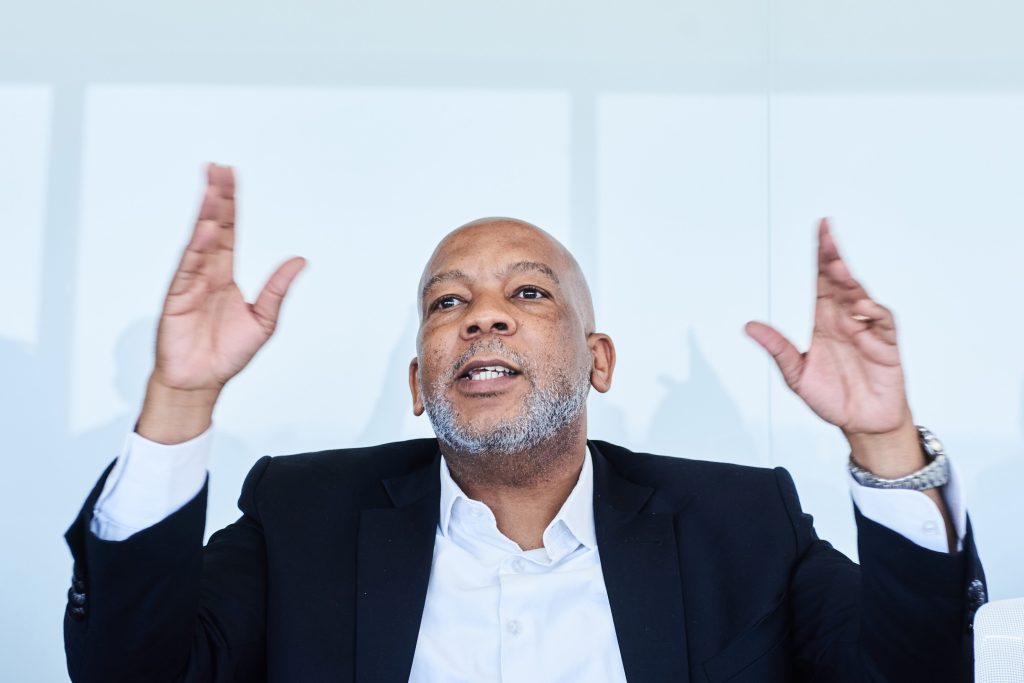South African President Cyril Ramaphosa is facing increasing pressure to hand powers to his new electricity minister and enable him to make decisions to stave off more intense blackouts as peak winter demand looms.
Two months after Ramaphosa appointed Kgosientsho Ramokgopa to the post, the president has yet to clarify what capacities he will transfer from the energy and public enterprises ministries, which have responsibility for policy and the state electricity company respectively, to the new office.
Control over energy procurement from independent producers and generation capacity, among other functions, would enable the minister to stave off the possibility of longer outages in the coming months, according to a government official.
Africa’s most-industrialised nation has been subjected to rolling power cuts almost every day this year as Eskom, the state company that supplies about 90% of the country’s electricity, fails to meet demand from its dilapidated plants. The crisis is eroding the nation’s economic-growth prospects, disrupting local supply chains and stoking inflation.
Ramaphosa is finalising what powers will be given to Ramokgopa and there’s no timeline on when a decision will be taken, presidency spokesman Vincent Magwenya said by text message.
While Ramaphosa’s administration has maintained that a complete collapse of the nation’s electricity grid is unlikely, some government members are advocating for a contingency plan to be put in place and made public as power cuts may intensify in the winter, the official said. Ramakgopa’s plans to address the situation are being hamstrung by Ramaphosa’s failure to transfer the necessary powers, the official said.
The minister pitched a proposal to the cabinet on Wednesday in which he laid out the options the government must consider in order to curb the crippling power cuts. They include exemptions for pollution emissions, extending the lifespan of coal-fired power stations, along with sourcing new funding to recapitalise Eskom and procure emergency power.
Crisis committee
A further assessment of the proposals will be considered by the National Energy Crisis Committee at a meeting that will be convened “as speedily as possible,” acting government spokesman Michael Currin said in a statement on Wednesday.
Eskom is currently implementing so-called stage 5 and 6 load shedding — removing between 5 000 and 6 000 megawatts from the grid that effectively leaves residents without power for at least 10 hours a day. A year before voters go to the polls in a general election, public anger is growing about the government’s inability to deliver basic services.
Ramaphosa’s decision to appoint an electricity minister was widely seen as a way to avoid dealing with ongoing tensions between Public Enterprises Minister Pravin Gordhan and Mineral and Energy Resources Minister Gwede Mantashe — two of his close political allies — over who has responsibility for energy. Usurping power from the energy minister risks leaving Ramaphosa without the political protection provided by Mantashe in his powerful position as chairman of the governing Africa National Congress.
The extreme power cuts have increased the possibility of the ANC losing its majority at the polls and being forced to govern through a coalition, according to a Social Research Foundation poll published this week. In a worst-case scenario, South Africa could face five months of so-called stage 8 load shedding this year unless there is an intervention, the official said.
Ramokgopa, a member of the ANCs national executive committee, is expected to present his plan to cabinet in a meeting that gets under way on Friday. He’ll use the meeting to lobby allies to impress upon Ramaphosa the need to be decisive about delegating the powers he needs, the official said.
© 2023 Bloomberg

